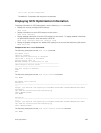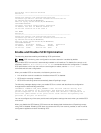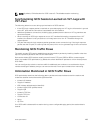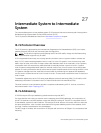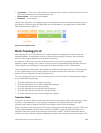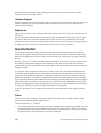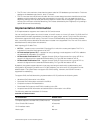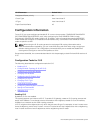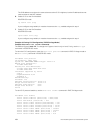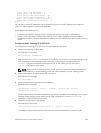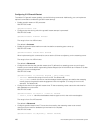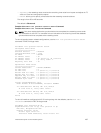
• The T2 timer is the maximum time that the system waits for LSP database synchronization. This timer
applies to the database type (level-1, level-2, or both).
• The T3 timer sets the overall wait time after which the router determines that it has failed to achieve
database synchronization (by setting the overload bit in its own LSP). You can base this timer on
adjacency settings with the value derived from adjacent routers that are engaged in graceful restart
recovery (the minimum of all the Remaining Time values advertised by the neighbors) or by setting a
specific amount of time manually.
Implementation Information
IS-IS implementation supports one instance of IS-IS and six areas.
You can configure the system as a Level 1 router, a Level 2 router, or a Level 1-2 router. For IPv6, the IPv4
implementation has been expanded to include two new type, length, values (TLVs) in the PDU that carry
information required for IPv6 routing. The new TLVs are IPv6 Reachability and IPv6 Interface Address.
Also, a new IPv6 protocol identifier has also been included in the supported TLVs. The new TLVs use the
extended metrics and up/down bit semantics.
Multi-topology IS-IS adds TLVs:
• MT TLV — contains one or more Multi-Topology IDs in which the router participates. This TLV is
included in IIH and the first fragment of an LSP.
• MT Intermediate Systems TLV — appears for every topology a node supports. An MT ID is added to
the extended IS reachability TLV type 22.
• MT Reachable IPv4 Prefixes TLV — appears for each IPv4 an IS announces for a given MT ID. Its
structure is aligned with the extended IS Reachability TLV Type 236 and it adds an MT ID.
• MT Reachable IPv6 Prefixes TLV — appears for each IPv6 an IS announces for a given MT ID. Its
structure is aligned with the extended IS Reachability TLV Type 236 and add an MT ID.
By default, the system supports dynamic host name exchange to assist with troubleshooting and
configuration. By assigning a name to an IS-IS NET address, you can track IS-IS information on that
address easier. The system does not support ISO CLNS routing; however, the ISO NET format is
supported for addressing.
To support IPv6, the Dell Networking implementation of IS-IS performs the following tasks:
• Advertises IPv6 information in the PDUs.
• Processes IPv6 information received in the PDUs.
• Computes routes to IPv6 destinations.
• Downloads IPv6 routes to the RTM for installing in the FIB.
• Accepts external IPv6 information and advertises this information in the PDUs.
The following table lists the default IS-IS values.
Table 28. IS-IS Default Values
IS-IS Parameter Default Value
Complete sequence number PDU (CSNP) interval 10 seconds
IS-to-IS hello PDU interval 10 seconds
IS-IS interface metric 10
Metric style Narrow
Intermediate System to Intermediate System
491



